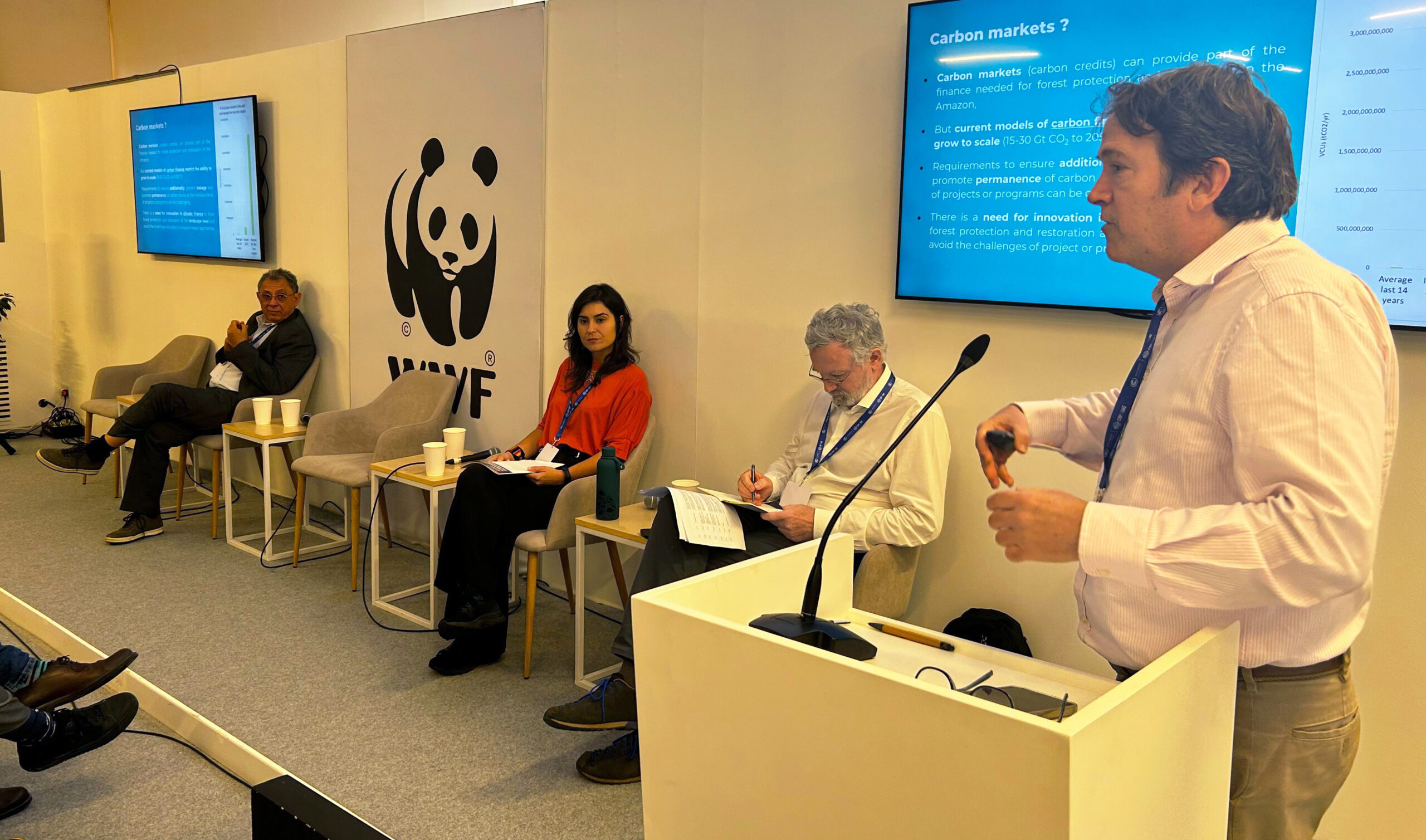At COP28 the world focused on tropical forests, marking a pivotal moment to confront challenges posed by the climate crisis. The SPA, as a central voice for science and the Amazon, provided policy relevant recommendations on key emerging issues through five Policy Briefs and an Amazon Drought Statement.
From November 30 to December 12, 2023, the United Arab Emirates (UAE) hosted the 28th Conference of the Parties to the UN Framework Convention on Climate Change (COP28) in Dubai. As part of COP28, the UN Sustainable Development Solutions Network (SDSN) mobilized its global network, prioritizing enforceable commitments on climate financing, a global goal on adaptation, operationalization of the loss and damage fund, cross-sectoral national action plans, and nature integration into long-term low emissions strategies.
The Science Panel for the Amazon (SPA) played a crucial role in advancing the SDSN’s COP28 core theme: “Science-Based Action for Nature”. Aligning with this priority, the SPA hosted two events on December 9th, where five new Policy Briefs (PB) were launched. These briefs cover critical priorities, including tackling illegalities, improving sustainable infrastructure for Amazonians, promoting sustainable forest management, avoiding tipping points, and addressing the human impact on carbon emissions and financial solutions.
During COP28 the SPA presented a Statement on the 2023 Amazon Drought. This comprehensive statement addresses the historical patterns and uniqueness of the 2023 drought, what could be foreseen in the short and long term, consequences and impacts of the drought, and recommendations on what actions to take now.

SPA’s first event at COP28, “Today’s Science for the Amazon of Tomorrow”, took place at the WWF Pavilion. The event was moderated by Roberto Waack, Member of the SPA’s Strategic Committee, and featured opening remarks by Emma Torres, SPA Strategic Coordinator, who highlighted that science is central for achieving the SDGs, and tropical forest conservation is critical for meeting the Paris Agreement Goals. Marielos Peña-Claros, SPA Co-chair, made closing remarks. Three of the new Policy Briefs were launched in this occasion:
- Land Markets and Illegalities: the deep roots of deforestation in the Amazon, presented by Lead Author Francisco de Assis Costa
- A new Infrastructure for the Amazon, presented by Author Ana Carolina Fiorini
- Human Impacts on Carbon Emissions & Losses in Ecosystem Services: The Need for Restoration and Innovative Climate Finance for the Amazon, presented by Lead Author Pedro Moura Costa
Pascal Martinez, Senior Environmental Specialist at Global Environment Facility (GEF), emphasized the links between science and finance, stating that the SPA Policy Briefs should serve as “a compass” for future strategies. Mauricio Voivodic, Executive Director of WWF Brazil, stated that “WWF’s strategies for the Amazon are based on science and informed by SPA recommendations”.
Key messages from the event included:
1. To effectively address the foundational issues of the land market, illegalities, and the vulnerable modes of production and life in the Amazon, it is crucial to empower governments and civil societies with robust informational resources, enhance national and international governance systems, and bolster local economies and social cohesion.
2. A new infrastructure paradigm is needed for the Amazon. New sustainable infrastructure should be planned by and for Amazonians, ensuring that local perspectives and realities are heard and taken into consideration.
3. To avoid irreversible tipping points, there is an urgent need to attract and deploy capital at scale to conserve and restore forests in the Amazon. This will require innovative approaches to climate and forest finance in addition to carbon markets.

The second event hosted by SPA, “The Resilient Amazon: From Tipping Points to Conservation and Restoration”, was held at the Amazon Governors’ Pavilion. The event was moderated by Michael Shank, Director of Engagement at Carbon Neutral Cities Alliance, and featured opening and closing remarks by SPA Co-chair, Carlos Nobre. On this occasion two Policy Briefs were launched, and a third one was presented again:
- Nine ways to Avoid an Amazon Forest Tipping Point, presented by Lead Author Adriane Esquivel and with the special intervention of Author Raquel Chaves, who reflected on the views of Indigenous Peoples regarding the tipping points
- Forest management for timber production and forest landscape restoration in the Amazon: The way towards sustainability, presented by SPA Co-chair and Lead Author Marielos Peña-Claros
- Human Impacts on Carbon Emissions & Losses in Ecosystem Services: The Need for Restoration and Innovative Climate Finance for the Amazon, presented by Lead Author Luciana Gatti
The event underscored key messages, including:
- The Amazon Tipping point is at reach. We have the solutions to avoid it. Now it is the time to act locally and globally.
- To avoid irreversible tipping points, there is an urgent need to stop deforestation and degradation, mainly on the “arc of fire”. Innovation in climate and forest finance, extending beyond conventional carbon markets, will be essential for this endeavor.
- Sustainable forest management in the Amazon is imperative, and requires changing current practices. Enhancing timber yields through cost-effective silviculture, promoting forest restoration, and supporting community-based forest management are key strategies to reduce pressure on natural forests.
SPA’s presence at COP28 was marked by the successful launch of five critical Policy Briefs and a Statement on the 2023 Amazon Drought. These initiatives offer comprehensive solutions to address the pressing challenges the region currently faces. As we reflect on COP28, the SPA’s contributions stand as a guiding compass for informed strategies, underscoring the vital role of science in shaping policies and practices for the conservation and sustainability of the Amazon. In the face of unprecedented environmental threats, SPA’s commitment to science-based action emerges as a beacon for the Amazon’s future.
Access our Publications here.
